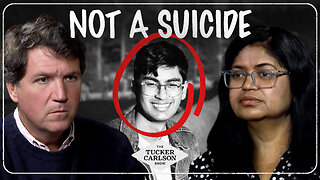Premium Only Content

Episode 1915: What to Do Before, During, & After Holy Communion ~ Fr. Ripperger - Part 1
Father Chad Ripperger, a well-known traditional Catholic priest and exorcist, often gives talks and lectures on various aspects of Catholic theology and spirituality. One of his popular topics is "What to Do Before, During, & After Holy Communion." Here's an overview of what might be covered in such a talk:
Preparation Before Holy Communion:
Examination of Conscience: Reflecting on one's thoughts, words, and deeds to identify any sins or areas needing repentance.
Act of Contrition: Expressing sorrow for one's sins and a firm resolution to avoid sin in the future.
Prayerful Preparation: Spending time in prayer, focusing on the significance of receiving the Eucharist and preparing one's heart to receive Christ.
Fasting: Observing the Eucharistic fast, which typically involves abstaining from food and drink (except water and medicine) for one hour before receiving Communion.
During Holy Communion:
Reverence and Respect: Approaching the altar with humility and reverence, recognizing the real presence of Christ in the Eucharist.
Proper Posture: Approaching the priest or extraordinary minister of Communion with folded hands and a reverent demeanor.
Reception of the Eucharist: Receiving the consecrated host on the tongue or in the hand (depending on local customs and norms), with faith and devotion.
After Holy Communion:
Thanksgiving: Remaining in prayer and thanksgiving after receiving the Eucharist, expressing gratitude for the gift of Christ's body and blood.
Spiritual Communion: Continuing to unite oneself to Christ spiritually throughout the day, even after leaving the church.
Reflection: Meditating on the graces received through the Eucharist and considering how to live out one's faith more fully in daily life.
Examination: Reflecting on one's disposition during Communion and any distractions or areas for improvement in future receptions.
Throughout the talk, Father Ripperger may also delve into the theological significance of the Eucharist, the doctrine of transubstantiation, and the importance of receiving Communion worthily and with proper disposition. He may offer practical advice for deepening one's spiritual life through the reception of the Eucharist and cultivating a greater love for Christ in the Blessed Sacrament.
-
 LIVE
LIVE
Space Ice
4 hours agoSpace Ice & Redeye: Battlefield Earth & Rob Schneider
175 watching -
 LIVE
LIVE
The StoneZONE with Roger Stone
2 hours agoMEDICAL MURDER: A Sneak Peak into the Making of Died Suddenly 2 | The StoneZONE w/ Roger Stone
352 watching -
 1:07:03
1:07:03
Tucker Carlson
2 hours agoMother of Likely Murdered OpenAI Whistleblower Reveals All, Calls for Investigation of Sam Altman
56.5K37 -
 55:44
55:44
LFA TV
9 hours agoCongress Humiliates Itself | TRUMPET DAILY 1.15.25 7pm
3.86K7 -
 LIVE
LIVE
2 MIKES LIVE
3 hours ago2 MIKES LIVE #167 News Breakdown Wednesday!
168 watching -
 LIVE
LIVE
Quite Frankly
6 hours ago"Fahrenheit 2025: Drone Hysteria, The Fog, Smart L.A." ft. Elana Freeland 1/15/25
1,371 watching -
 1:43:00
1:43:00
Redacted News
5 hours agoBREAKING! CAPITOL POLICE ON HIGH ALERT OVER ATTEMPTS AGAINST TRUMP, MEDIA SILENT | Redacted
120K171 -
 51:09
51:09
Candace Show Podcast
4 hours agoHILARIOUS! TikTok Ban Backfires | Candace Ep 133
90.7K112 -
 LIVE
LIVE
Dr Disrespect
9 hours ago🔴LIVE - DR DISRESPECT - WARZONE - NO MERCY
2,584 watching -
 LIVE
LIVE
Mally_Mouse
2 hours agoLet's Hang!! -- P.O.Box opening! & Stardew Valley pt. 20!
162 watching